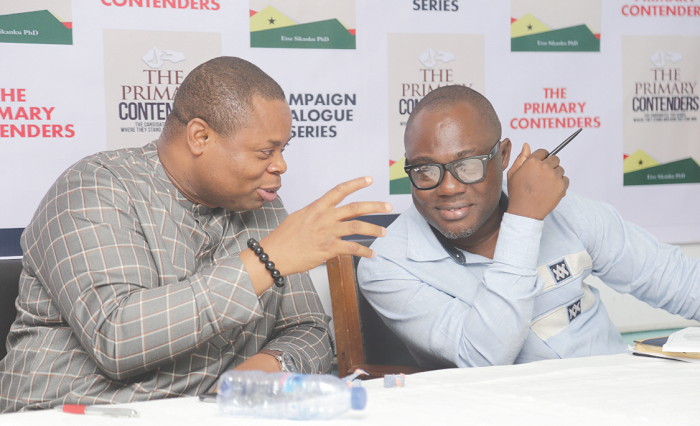
Speakers at a forum to dissect Ghana’s presidential primaries with focus on the National Democratic Congress (NDC) have called for a rethink into how such primaries have been monetised at the expense of electing competent leaders for political parties who subsequently get elected as President.
They contended that the mode of selecting presidential candidates denied the larger Ghanaian citizenry the opportunity to have a say in the selection process.
They shared their perspectives at an event dubbed: “Upholding the Democratic Process: Unpacking and Understanding the NDC presidential primaries” in Accra last Thursday.
The event, which was organised by Dr Etse Sikanku, a lecturer at the Ghana Institute of Journalism, was to launch his book titled: “The Primary Contenders: the candidates, the issues, where they stand and how they can win.”
The book is a contribution to entrenching the foundations of Ghana’s democracy by focusing on the presidential primaries.
It offers an overview of the candidates, their strengths and weaknesses, where they stand and strategies to adopt.
Speakers

Mr Franklin Cudjoe (left), Founder and President, IMANI Africa, interacting with Prof. Ransford Gyampo, after the event.
Speaking on the topic were Professor Ransford Gyampoh, a Political Science lecturer at the University of Ghana; Dr Kobby Mensah, a lecturer at the University of Ghana Business School; Mr Franklin Cudjoe, the President of IMANI Ghana and Mr Paul Adom Otchere, a broadcast journalist.
Setting the tone for the discussion, Dr Mensah said the political parties elected their candidates based on the wishes of the few rich within the political establishment.
He called for a change in that approach of electing party leaders to allow for the ordinary person to also have a say in the selection process of who eventually should be President of the country.
Regrettably, he indicated that the party leaders did not put their ideological beliefs in the centre of affairs as they failed to connect their political ideological beliefs to the solution of problems.
“We need solution to problems rooted in ideological values to serve the interest of the people who share in those beliefs,” Dr Mensah said.
No empty promises
Taking his turn, Mr Cudjoe demanded of the yet-to-be-elected NDC presidential candidate to tell Ghanaians to what level he would take the country and depart from making vain promises to the people.
He said it was important for the NDC candidate to have credible plans of a dossier on the solutions he intended to proffer for the current difficulties the country was going through.
“We should not elect leaders based on how sexy they look but rather look at who among the candidates has concrete vision to turn things around,” Mr Cudjoe added.
For Professor Gyampoh, political party primaries had evolved since the country reintroduced multi-party democracy in 1993.
He expressed the hope that as time evolved, the incidence of vote buying during political party primaries would become a thing of the past.
Prof. Gyampoh urged presidential candidates of opposition parties in Ghana not to mistake their seeming popularity in a section of the media for a general acceptance of the larger electorate.
“We need a candidate who has superior ideas than other candidates to offer solutions to our problems,” he said.
Review the law
On his position on the matter, Mr Otchere called for a second look at the political parties’ law to review the election of national officers of the registered political parties.
He decried the huge expenditure involved in conducting such elections and suggested that it was possible for the flag bearer of a political party to appoint a national officer in the same manner as a running mate was selected.
He said unlike the New Patriotic Party (NPP) whose presidential candidate was always determined ahead of congress, that of the NDC was different because of their ideological stand and so the candidate was always known after an election.
Earlier, Dr Sinkanku had explained that he chose the NDC for the discussion because it was the largest opposition party in Ghana that chose its candidate two years ahead of the next general election.
He stated that it was appropriate to use the NDC at this particular time because it was in the process of electing its national officers and later, the flag bearer before the close of the year.